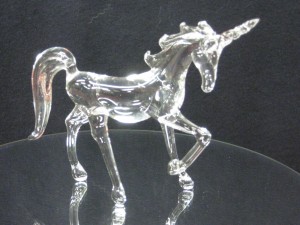The following questions were considered during the World Café discussion in class today. Selected responses are recorded below.
Is Amanda a good mother?
- YES –> good intentions toward her children, works to support the family, invests time and money into finding Laura a husband, stays with her children despite trouble, genuinely thinks her way is best, stays (unlike their father), tries to help her children advance, won’t allow “crippled” as a descriptor for Laura, comforts Laura at the end
- NO –> very pushy, doesn’t understand Tom’s dreams because she’s worried about Laura and her own situation, overcontrolling, lost in a dream world of the past, actions reflect her desires rather than children’s needs/wishes, superficial, unkind to Tom because he reminds her of her husband, seems more focused on her children’s success than happiness
The Glass Menagerie is a play about _____ because _____.
- Selfish desires – Tom’s and father’s choice to leave, Amanda’s controlling nature
- Regret – Tom regrets leaving Laura
- Misunderstanding – Amanda doesn’t understand either of her children’s wishes
- Appearance vs. Reality – setting of apartment, Laura hiding her disability,
- Deception – Tom’s explanation about where he’s going and why, playing happy family for Jim when they’re not, Laura shrugging off the broken unicorn
- Love and betrayal – characters lying to protect other characters’ feelings, Laura hiding what she’s been doing instead of going to school
- Family – Amanda expecting Tom to be a better man than his father
- Dreams – character’s dreams unspoken to each other, expectations for other characters
- Finding yourself – Tom rejecting the warehouse to write, Amanda clinging to the Southern belle she used to be, Laura retreating into her world of glass
- Illusion – Amanda lives in the past, Laura lives in her glass world, Tom wants to escape to adventure
- Abandonment – Jim abandons Laura (hope), the father abandons the family, Tom abandons Amanda and Laura
Who is the most important character in the play? Explain.
- Amanda – she is the most present of all the characters (appears in most of the scenes), she drives the play and determines the actions of the other characters, she acts as the rock/glue for the family, she presses her desires on her children, she sets the whole play in motion, themes relate back to her relationship with everyone else
- Tom – play is told from his perspective, all conflicts relate back to him, he carries the emotions from the events, when his character leaves the family ceases to exist, focal character, his choice to bring Jim invites the play’s climax, he ends the action on his terms
- Laura – the main action of the play concerns plans for her future, the other characters’ focus in on Laura, the lighting asks the audience to pay attention to her, she has the most emotional development of the characters,
- the father – he’s the reason for their current situation, characters’ choices are viewed in comparison to his, he’s always watching (figuratively) the fallout his leaving created, his absence is the catalyst for both Amanda’s and Tom’s characters
Name and discuss the significance of an important symbol in the play.
- glass menagerie – Laura’s fragility and her hopes/dreams
- father’s picture – constant reminder of his abandonment, foreshadowing of what Tom will become,
- Victrola – Laura’s unwillingness to move and how her life is painfully repetitive
- typewriter – both Tom’s ambitions and Laura’s failed attempts at success,
- merchant marine uniform – Tom’s desire for adventure and foreshadowing of his eventual choice to leave
- blue roses – Laura’s peculiarity and attractiveness,
- fire escape – escaping the family to pursue dreams, when called the “terrace” it romanticizes their reality
- movies – Tom’s escape, further heightening of illusion vs. reality theme
- fancy lamp – illusion that the family is more than it appears to be (happy and comfortable)
- glass unicorn – Laura’s uniqueness, when its horn is broken it shows Laura trying to fit in and be accepted, broken relationship with Jim, her nervousness (when it breaks, she feels more open)
- Amanda’s dress – her clinging to the past, compares her wealthy past to her poorer present
- Jim – the “very ordinary young man” who contrasts greatly with the flawed family
How does the setting function to reveal character and provide insight on theme?
- Gloomy apartment – contributes to bleak and depressing tone, current lifestyle contrasts with the past and reinforces idea of “memory play”
- Living room – one set highlights Laura’s isolation from the world, same set throughout play heightens sense of characters being trapped in their circumstances
- New furnishings – reveals how things aren’t usually as they seem (deception; appearance vs. reality), illusion that they are more than they appear to be, shows Amanda’s wish to be like she was–genteel, Southern, and rich–than what she is
- Fire escape – Tom escaping the family
- St. Louis/South – reinforces traditional roles for women (security, marriage), enhances Amanda’s mentality that Tom and Laura do not share,
- Open windows – lets in music and other pleasures not available to the people in the apartment, reinforces Tom’s wish to escape
Do the images on the screen enhance or detract from the play? Explain.
- ENHANCES –> contributes to the idea of a “memory play” because they are dreamlike like memories, adds to visualization, helps with background knowledge not presented through setting and text, provides insight into what characters are thinking, provides symbolic meaning, reflects how things are remembered, provides comic relief, clarifies possible ambiguities in the dialogue, sets the mood for scenes, adds diversity and interest in the confined setting
- DETRACTS –> pulls attention from what the actors are doing, takes away element of suspense, can be unnecessarily distracting, can dictate opinion of the audience

